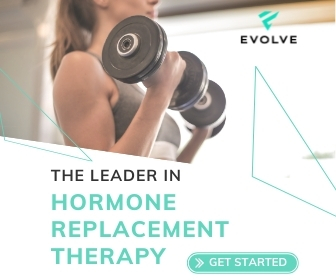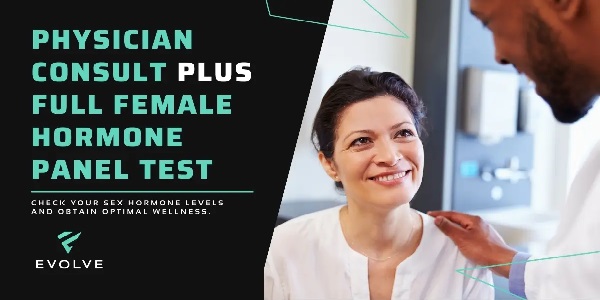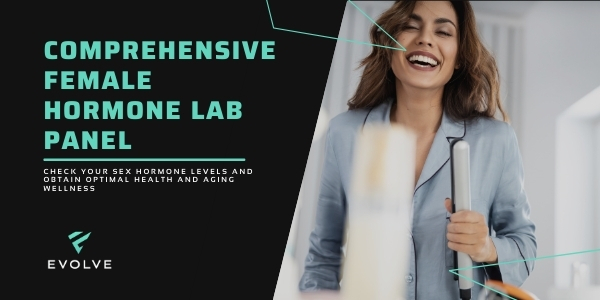Hormone Replacement Therapy for Women in Kirkland, WA
We help you find an HRT specialist near you.
EVOLVE is the leader in hormone replacement therapy, providing optimal health and wellness care via telemedicine.
Diagnostic Labs
Your doctor may order a blood test to check your hormone levels and evaluate treatment options.
Certified Physicians
We help you find board certified Hormone Replacement Therapy providers in your area.
Custom Treatment Plans
Discuss treatment options with your doctor and find the plan that’s right for you.
Continued Patient Care
Your doctor will continue to monitor your symptoms and hormone levels to adjust your treatment as needed.

Hormone Replacement Therapy for Women
Balancing Hormones Can Help
- Decrease Belly Fat
- Heighten Libido
- Increase Bone Density
- Enhance Skin Tone
- Elevate Mood
- Improve Sleep
Typical HRT Treatments for Women
- Balance Estrogen Levels
- Adjust Progesterone
- Add Testosterone
Symptoms of Hormone Imbalance in Women: Overview
Hormone imbalance may cause feelings of depression, anxiety, fatigue, hot flashes, insomnia, lack of sex drive or just a constant under-the-weather feeling. The major hormones in women that typically need balanced management are Estrogen and Progesterone, and many may also benefit from improved Testosterone levels.
Common symptoms include:
- Night sweats
- Fatigue
- Weight gain
- Mood swings
- Depression
- Anxiety
- Trouble sleeping / Insomnia
- Vaginal dryness
- Loss of sex drive
- Irritability
- Loss of muscle
- Dry skin
Where Can I Get HRT in Kirkland, Washington
Best HRT Doctors in Kirkland, WA
Diagnosing and treating hormone deficiencies and imbalances in women requires the attention of a physician specializing in adult female hormone replacement therapy. Every woman is an individual, and likewise, will have to be treated as an individual. An HRT physician will take into consideration your individual medical history, symptoms and comprehensive lab results to determine the correct treatment protocol tailored specifically for you.
It is important to note that not every adult female will be a candidate for Hormone Replacement Therapy. This is why it’s very important that you speak with a doctor who specializes in treating Hormone Imbalance in women to discuss the right treatment for you.
Cities Near Kirkland, WA
- Juanita, WA
- Houghton, WA
- Yarrow Point, WA
- Hunts Point, WA
- Kenmore, WA
- Redmond, WA
- Woodinville, WA
- Clyde Hill, WA
- Sheridan Beach, WA
- Bothell, WA
- Medina, WA
- Lake Forest Park, WA
- Ridgecrest, WA
- Meridian, WA
- Canyon Park, WA
- North City, WA
- Cottage Lake, WA
- Lake Hills, WA
- Brier, WA
- Shoreline, WA
- Bellevue, WA
- Turner Corner, WA
- Seattle, WA
- Richmond Highlands, WA
- Beaux Arts Village, WA
- Mountlake Terrace, WA
- Sahalee, WA
- Kennard Corner, WA
- Alderwood Manor, WA
- Maltby, WA
- Eastgate, WA
- Esperance, WA
- Clearview, WA
- Seattle Heights, WA
- Mercer Island, WA
- West Lake Sammamish, WA
- Richmond Beach, WA
- Lynnwood, WA
- Sammamish, WA
- Novelty, WA
- Hazelwood, WA
- Martha Lake, WA
- Edmonds, WA
- Woodway, WA
- Duvall, WA
- Newport Hills, WA
- North Lynnwood, WA
- Pine Lake, WA
- Mill Creek, WA
- Cathcart, WA
- Zenith, WA
- Woodmont Beach, WA
- White Center, WA
- Wabash, WA
- Vashon, WA
- Vashon Heights, WA
- Upper Mill, WA
- Upper Preston, WA
- Tukwila, WA
- Thomas, WA
- Tahlequah, WA
- Tanner, WA
- Sunnydale, WA
- Spring Glen, WA
- Snoqualmie, WA
- Snoqualmie Falls, WA
- Skykomish, WA
- Skyway, WA
- Selleck, WA
- Seahurst, WA
- SeaTac, WA
- Riverbend, WA
- Redondo, WA
- Renton, WA
- Ravensdale, WA
- Preston, WA
- Portage, WA
- Pleasant Hill, WA
- Pacific, WA
- Palmer, WA
- North Hill, WA
- Normandy Park, WA
- North Bend, WA
- Newaukum, WA
- Newcastle, WA
- Mirrormont, WA
- Maple Valley, WA
- Magnolia Beach, WA
- Lisabeula, WA
- Lester, WA
- Lakota, WA
- Kummer, WA
- Kennydale, WA
- Kent, WA
- Kanaskat, WA
- Kangley, WA
- Issaquah, WA
- Hobart, WA
- Grotto, WA
- Georgetown, WA
- Fairwood, WA
- Fall City, WA
- Federal Way, WA
- Enumclaw, WA
- Ellisport, WA
- East Renton Highlands, WA
- Dockton, WA
- Des Moines, WA
- Cumberland, WA
- Cove, WA
- Covington, WA
- Coalfield, WA
- Colvos, WA
- Christopher, WA
- Cedar Falls, WA
- Cedar Grove, WA
- Cedar Mountain, WA
- Cedarhurst, WA
- Carnation, WA
- Burien, WA
- Burton, WA
- Bryn Mawr, WA
- Boise, WA
- Boulevard Park, WA
- Black Diamond, WA
- Berrydale, WA
- Bayne, WA
- Baring, WA
- Auburn, WA
- Ames Lake, WA
- Algona, WA
- Allentown, WA
- Adelaide, WA
What are the Female Hormones?
At any given time, every woman has different levels of estrogen and progesterone – the primary female hormones – in her body. Many don’t realize though that testosterone, the primary male hormone, is also critical to a woman’s hormone picture – or that there are actually three kinds of estrogen, each with a different function. (By the way, men also produce estrogen!) More importantly, all too few are aware that these hormones are not responsible just for sexual and reproductive functions like fertility and pregnancy. They also play a critical role in your overall wellness and vitality – for you as a woman and a human being. That’s why hormone imbalances can be the culprit in a wide range of physical and mental health conditions that can also be caused by other factors – making diagnosis and treatment an uncertain and often frustrating business.
What Exactly Does Each Hormone Do?
Estrogen
Estrogen’s main role is to develop and help maintain your female body characteristics and set the stage for egg fertilization – even making your voice higher than a man’s and directing where your body stores fat. But it also promotes overall wellness: it helps regulate body temperature and works in concert with other brain chemicals to maintain a positive mood and mental sharpness, keeps skin healthy and supple, maintains bone strength and density, and protects the heart and arteries by regulating cholesterol production.
Progesterone
Progesterone maintains the pregnancy once fertilization occurs and facilitates birth and postnatal functions. While it has no known overall wellness role like estrogen, it can negatively impact mood in some women and balances estrogen.
Testosterone
Women’s bodies make one-tenth to one-twentieth the amount of testosterone that men’s bodies do. It contributes to reproductive system health, healthy levels of tissue and bone mass, red blood cell production, fertility, and libido.
Hormone levels adjust continuously in women’s bodies – depending on age/stage of life, menstrual cycles, whether or not they’re pregnant, postpartum or nursing, even the time of day. The process of menopause is the overall decline in hormone levels that culminates in menstruation – and fertility – ending permanently.
Why Not Just Let Nature Take Its Course?
While women’s hormones have always fluctuated and declined, a recent human development has totally changed the game.
For much of history, until abot the year 1900, the average lifespan was 30 to 40 years – essentially coinciding with the end of women’s childbearing years and around the time they would likely begin experiencing menopause-related symptoms. In just the last century, the human lifespan has doubled – leaving half of a woman’s life open to the effects of declining hormones. While some women experience few if any problems, many more do, and overall the human body simply hasn’t caught up with the fact that in just a short time we’ve started living twice as long.
What are the Symptoms of Hormone Imbalance?
Decreased or imbalanced hormones can cause or contribute to a vast array of symptoms that women may begin experiencing in their 30’s. Many like hot flashes (sudden, intense overheating) and night sweats (waking in the night sweating profusely) are common knowledge and easily associated with menopause. Many other symptoms are common but tend to be vague, which makes them no less debilitating but less likely to be identified as hormone-related.
- Irritability – feeling intolerant of things that didn’t bother you before – like “nothing rolls off your back”
- Mood swings – sudden, dramatic changes in mood
- Sleep disturbances – the inability to fall or stay asleep
- “Brain fog” – forgetfulness, difficulty focusing and thinking clearly
- Depression – not fleeting sadness over events, but persistent and sometimes debilitating feelings of hopelessness, discouragement, detachment
- Feeling low-energy, tired or exhausted
- Hair loss/hair becoming dry, brittle and dull
- Skin thinning and losing plumpness and suppleness
- Loss of bone mass/osteoporosis
- Lack of vaginal lubrication, sometimes causing painful sex
- Lack of or changing sexual desire
- Weight gain (especially around the abdomen), which can be exacerbated by other symptoms such as fatigue/lower activity levels
- Irregular and/or heavy periods
While trying to understand and cope with these symptoms is difficult enough, many can have profound impacts on women’s careers, relationships, activities, and long-term sense of well-being. And when the period of hormonal decline now covers half of a woman’s life, many women want an alternative to “letting nature take its course.”
Ages and Stages of Menopause
Menopause
People don’t like to talk about it or think about it – even with those they’re closest to or their health practitioners. It’s no surprise then that lack of information and misinformation abounds, which can leave women feeling confused and isolated.
Menopause isn’t a moment in time when your last menstruation has happened. It’s a process that lasts years, even decades for some, and you may be totally unaware at any point of what’s happening. Essentially, your body begins to make less and less estrogen – the hormone that promotes fertility and overall vitality. Similarly, there is less and less progesterone and testosterone.
Part of what makes each woman’s menopause individual, and can greatly affect the appearance and severity of symptoms, is the fact that the decline in estrogen is unlikely to be a smooth downward curve that your body can adjust to gradually and continuously. It is far more likely to fluctuate over time, literally throwing your body and mind for a loop and leaving you not knowing what to expect next.
Pre-Menopause & Perimenopause
It doesn’t help that terms around menopause aren’t used consistently – especially pre-menopause and perimenopause, which are often used interchangeably but are actually different things.
During pre-menopause, still during a woman’s reproductive years, hormones have begun to decline but the process is “silent” – and this is actually happening in a woman’s twenties and/or thirties.
Perimenopause, which just means “around the time of menopause” and is when symptoms begin to manifest, follows next, during the thirties and/or forties. Especially now, when women are tending to have children later in life, they can easily be raising and even nursing young children and also be in perimenopause. Fertility-wise, during perimenopause you are still releasing eggs but the likelihood of fertilization and pregnancy is declining and periods are likely irregular.
Postmenopause
When finally estrogen levels are so low that you no longer release eggs, your periods will stop. You are considered to have reached menopause after one year of your periods stopping altogether, at which point you are postmenopausal. In the U.S. the average age of menopause is 51, with an average range of 48 to 55. And most women have decades of life ahead of them at that point that we would all like to make as healthy and fulfilling as possible.
How Does Hormone Replacement Therapy Work?
As with menopause itself, there’s a lot of confusing and conflicting information out there about hormone replacement therapy (HRT) – its benefits, its drawbacks, its risks. What’s often missing from the discussion is that there are different kinds and methods of HRT. You can get very different answers and solutions from the different kinds of health practitioners that administer HRT – ob/gyns, GPs, internists, and NDs (naturopathic doctors).
Perhaps most importantly though is the difference between bioidentical hormones and conjugated or synthetic hormones. Bioidentical hormones are those that are identical in molecular structure to the ones a woman’s body makes (Source: https://www.ncbi.nlm.nih.gov/pmc/articles/PMC4132968/), while non-bioidentical hormones differ. The lion’s share of information from media and other sources is talking about conjugated/synthetic hormones. That won’t usually specifically identified, although they will sometimes be referred to as “traditional” HRT.
Based on testing and symptoms, women may be treated with replacement estrogen and/or testosterone. Progesterone must also be used to balance out the estrogen. Bioidentical hormones are applied to the skin in form of gels or creams or ingested as tablets according to a physician-specified regimen.
How Can HRT Improve My Health and Quality of Life?
Increasing and balancing hormone levels through HRT can help restore your mental and physical well-being by:
- Relieving hot flashes and night sweats
- Reviving sex drive and enhancing sexual functioning
- Supporting hair and skin health and appearance
- Improving sleep
- Clearing “brain fog” and restoring memory and mental acuity
- Protecting against osteoporosis
- Stabilizing mood and lifting depression
- Increasing energy levels
- Countering weight gain
FAQs
Will my hormone replacement be synced with my menstrual cycle?
The female body’s hormones surge and ebb as a part of a natural rhythm, controlling all endocrine function, predominantly a woman’s health for reproduction. It is the circadian clock in our cells that measures one 24 hour spin of the planet. For 28 days the moon tracks the repeat of that cycle, and so does the body. Typically your doctor will prescribe a treatment that aligns with the female body’s natural rhythm of hormone production to establish the proper doses of estradiol, testosterone, and progesterone that mimic the natural hormones which would be produced by your body if you were young. The topical creams and their amounts vary throughout the 28 day cycle to restore the hormone levels of a woman in her prime because young women, for the most part, don’t have heart attacks, breast cancer, Alzheimer’s, osteoporosis, or type 2 diabetes.
What are Bioidential Hormones?
Bioidenticals are hormones that are identical in molecular structure to the hormones women make naturally in their bodies. They’re not found in this form in nature, but are made from a plant chemical extraction process. Ask your doctor if bioidentical hormone treatment is right for you.
What are the risks of Hormone Replacement in Women?
- Urinary incontinence – Use of estrogen plus progestin can increase the risk of urinary incontinence.
- Dementia – Use of estrogen plus progestin can increase the risk of developing dementia among postmenopausal women age 65 and older.
- Stroke, blood clots, and heart attack – Women who either combine hormone therapy treatments or take estrogen alone have an increased risk of stroke, blood clots, and heart attack.
- Breast cancer – Women who take estrogen plus progestin may be at a higher risk of being diagnosed with breast cancer.
- Irritability – Some women have reported increased aggressiveness or irritability at the start of hormone therapy that includes Testosterone. These issues are generally resolved as levels become balanced. If this is a concern, please advise your HRT Wellness doctor, and have Testosterone removed from your treatment plan.
What role does Testosterone play in women?
Although only a small amount is required for women, testosterone plays a role in a women’s sex drive as well as the ability to build and retain lean muscle mass.
I have had a hysterectomy; am I a candidate for HRT?
Our entire bodies need estrogen and progesterone. The cycle supports our bones, our brains, the myelin coating of our nerves, our hearts and many other systems. Women without a uterus and or ovaries tend to need more hormone replacement because of what is missing. A woman without a uterus follows the cycle of the moon (lunar calendar) for her monthly rhythms. She has her day 12 peak on the full moon. Talk to your doctor to see if Hormone Replacement Therapy is right for you.




